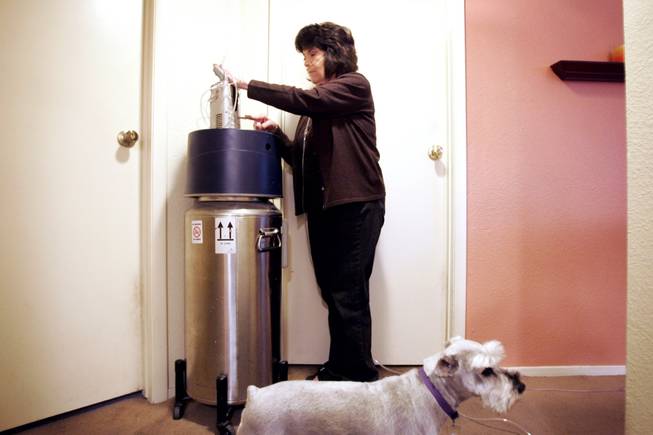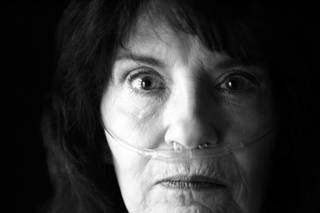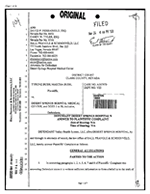
Las Vegas resident Julie Rich, who contracted MRSA in 2005 after an outpatient procedure at a local hospital, adjusts the oxygen machine that keeps her alive.
Sunday, Aug. 8, 2010 | 2 a.m.
Do No Harm: Hospital Care in Las Vegas, Part 2
- A hidden epidemic
- Hospital stay will stay with her always
- VA system stanching MRSA
- Hospital’s sanitation promises quickly forgotten
- Billing codes key to data analyzed on infections
- Where I Stand: Rise in infection rates, hospitals’ reticence are troublesome
- Editorial: Hospitals should do more to protect patients from deadly bacteria
- ‘We’re the ones who are in there. Our lives are entrusted to them.’
- Health board backs limits on disclosure of infections
- How best to stem spread of infection?
- St. Rose breaks ranks with disclosure on quality of care
Share your stories
Julie Rich lives tethered to an oxygen machine, its low hum and hiss constant companions, the vinyl tubing always underfoot. It is a reminder of the aggressive bacterial infection she contracted after a surgical procedure at a local hospital.
It's impossible to know how the 69-year-old acquired the infection that almost killed her, but for Rich certain details stand out: a dirty hospital room, an improperly installed catheter and inattentive care.
Rich, who is retired after a career of working in casinos — bartending, serving cocktails and working as a hostess — arrived early for her appointment on May 28, 2005. Then she waited for hours in a room that she said was soiled with a sticky, pink substance and with a bathroom that had urine on the floor. "The whole place was just dirty," she said.
During the 20-minute procedure to treat incontinence, her urologist, Dr. Michael Kaplan placed a sling to control urine flow in her urethra and bladder. Before sending her home, an employee inserted a urinary catheter attached to a collection bag.
The Sun made multiple calls to Kaplan's office for comment. He did not call back.
After returning home Rich realized the collection bag would not empty, stressing her bladder.
Her family called the hospital, Kaplan's office and medical-supply companies. But it was Memorial Day weekend, and they couldn't reach anyone.
Finally, Rich and her daughter jammed a stick into a valve to force it open, releasing the pressure.
The following Tuesday morning, Rich rushed to Kaplan's office, where staff told her that someone at the hospital had improperly installed the catheter bag.
They corrected the problem. But a week later Rich was still in pain.
During another follow-up appointment at Kaplan's office, a nurse did a cursory check of the wound and sent her home, Rich said. When she asked for another visit because of continuing pain, she was told to wait until her next appointment, on June 16, she said.
She woke that day, she said, shaking and with indescribable abdominal pain. When Kaplan saw the wound, yellow with pus, he sent Rich to the St. Rose Dominican Hospital — Siena emergency room. He was quick to tell her she had a "hospital induced" infection, she said.
Doctors at St. Rose diagnosed Rich with sepsis — an infection that makes its way into the bloodstream — and Methicillin-resistant Staphylococcus aureus, better known as MRSA, a bacterial infection resistant to many antibiotics.
Thus began a 23-day stay at the hospital.
Kaplan called Rich at St. Rose to tell her he was going to remove the sling.
Rich told him she wanted another doctor to perform the procedure.
"I don't feel I got good aftercare," she said later. "I was never allowed to see him (Kaplan), only nurses, and I was complaining about not feeling well, and they were ignoring me, saying 'You were just here,' and treating me like I was an alarmist instead of just someone who was sick ... I feel it was his duty to make sure everything was OK, and he didn't."
Kaplan has a record of discipline and malpractice cases with the Nevada State Board of Medical Examiners. But a surgeon who reviewed Rich's medical records at the Sun's request said it is impossible to determine how or where she became infected because MRSA resides throughout hospitals, and that there was no evidence that Kaplan contributed to the problem.
Rich hardly remembers the more than three weeks she spent at St. Rose.
Medical records show that two days after Rich was admitted, another doctor removed the infected sling and cleansed the area.
For weeks she drifted in and out of consciousness as the bacteria ravaged her lungs. Her condition grew so dire doctors summoned her family to say their final goodbyes.
Because sepsis inhibits blood coagulation, blood pooled near Rich's kidney, requiring more surgery, the records indicate.
A series of complications followed, some likely caused by MRSA, others possibly worsened by her body's weakened state, according to the surgeon who reviewed her medical records.
St. Rose's bill totaled about $275,000, Rich said.
The ordeal cost her confidence in doctors and hospitals, Rich said. Patients should question more and not be afraid to request that their health care providers wash their hands, she added.
"They're just not as careful as they should be. They're just not as dutiful as they should be as far as infections are concerned. I don't understand why because they're putting people's lives at risk.
"I was probably too trusting," she said.
Rich never tried suing the doctor or the hospital. Attorneys don't take those cases because it's too difficult to prove precisely what caused the infection.
She said she's been told that the infection took years off her life expectancy. The oxygen machine, and its quiet hiss, will be her companions forever.




Join the Discussion:
Check this out for a full explanation of our conversion to the LiveFyre commenting system and instructions on how to sign up for an account.
Full comments policy